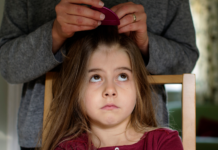Preschool teachers understand that preschool isn’t a required part of schooling, but the skills learned in a preschool classroom are so very important. Aside from an early childhood academic curriculum, preschool is a wonderful opportunity for your child to grow and learn socially and emotionally.
 Over the past two years, many parents opted to keep their children home instead of sending them to preschool. As a result, teachers across the country are welcoming many children into their preschool, pre-K, and Kindergarten classrooms who are struggling socially, emotionally, and academically.
Over the past two years, many parents opted to keep their children home instead of sending them to preschool. As a result, teachers across the country are welcoming many children into their preschool, pre-K, and Kindergarten classrooms who are struggling socially, emotionally, and academically.
This simply is what it is, and no one is to blame. The COVID-19 Pandemic has altered the trajectory of all of our lives, even if in seemingly insignificant ways. But preschool teachers want you as parents to know that the skills learned in preschool are far from insignificant. If sending your child to preschool hasn’t been or isn’t a current option, there are many things you can do at home to help your child grow in all aspects.
Here are five things preschool teachers want you to know, and encourage you to adopt at home:
Teacher’s Tip# 1: Ditch The Electronics…{or at least try for a day or two a week!}
Fine motor growth is not going to be improved by swiping or tapping an iPad or a Kindle. While it might not be realistic to take these devices away entirely, please don’t make them a staple of your child’s life right now. Get out some scissors and paper, and practice cutting. Grab some markers and draw. Pull out the play dough and create – have your child practice opening the canister, getting the play dough out on their own, and then manipulating it into different objects and shapes. Spray some shaving cream on a disposable tablecloth and let your child use their fingers to draw and form shapes or letters. Fine motor strength has to be built. It’s not easy at first, but practice does make progress. There are so many FUN ways for kids to grow in this area…but they have to be given the opportunity.
Teacher’s Tip #2: Read
You hear it all the time, right? But the simple act of reading to your child even once a day is so incredibly beneficial. Let them hear your voice, cadence, and inflection. Have them hold the book and help you turn the pages. Point out illustrations on the pages, and ask questions. If your child is ready, focus on simple words and letter sounds – m makes the mmmmm sound – and so forth. Simple, yet so effective. Carving out a time and spot for reading each day is so special. If you’re not already doing this, we promise that you will both benefit from the bonding and learning this time offers. Looking for books? Here are some awesome suggestions, or visit your local library.
Teacher’s Tip #3: Create Social Opportunities
Meet friends at a park. Have a playdate in your home. Connect with children that are your child’s age. Step back and watch them navigate the world of play. This includes sharing, taking turns, and having an awareness of others. Social opportunities for younger children were virtually shut down during the height of the pandemic. If your child didn’t have the opportunity to connect with others and learn to play with peers, try to do so now. The classroom will be less overwhelming if your child is accustomed to interacting with children of the same age. Any opportunity that you can create here is beyond beneficial for your child’s social and emotional growth.
Teacher’s Tip #4: Not All Germs are Bad!
Piggybacking on creating social opportunities, it’s important to highlight this sometimes controversial statement. Germs are not all bad, we promise! If you’re sending your child to school and he or she seems to constantly get sick, it’s not that our classrooms aren’t clean. It’s not that your child isn’t washing his or her hands. Immunity must be built. Kids pick their noses, wipe their snot on their sleeves, and are still learning how to cover their sneezes and coughs. This is ALL normal and OK. We promise! Exposure to germs will help to strengthen their immunity and will assist in fighting off some of those common, pesky germs and viruses in the future.
Teacher’s Tip #5: Foster Independence and Self-Sufficiency; Practice Makes Progress
Have your child practice putting on their own clothes, socks, shoes, and jackets. It won’t be easy at first. It will take time. Your child may get frustrated. Fight the urge to step in and take care of it all. Instead, offer guidance and support, and praise, praise, praise their efforts – it’s a big deal to learn how to do these seemingly easy tasks! This simple Flip Jacket Hack is genius, and children are so proud of themselves when the skill is mastered! Practice zipping and snapping – backpacks, pants, jackets, lunchboxes, and more. Again, it takes time but with consistent practice, your child will make so much progress. By Kindergarten, these are skills that most children are expected to master. Give your child a head start by creating opportunities for him or her to practice these independent tasks at home.

Watching children learn, grow and flourish in all areas is so amazing. Early childhood education focuses on the whole child, and the social and emotional benefits are just as important as the academic ones. If sending your child to preschool isn’t an option, please consider incorporating the above areas of learning into your child’s daily life.
As Mr. Rogers once said, “a love of learning has a lot to do with learning that we are loved.” Preschool teachers do what we do because we love children. We not only want to see your child thrive – we want them to soar!















